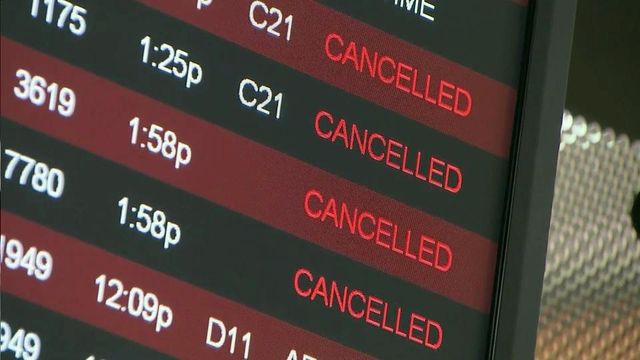Fire at Chicago air traffic hub causes delays at RDU
All flights in and out of Chicago's two airports were halted Friday after a fire at a suburban air traffic control center that authorities said was deliberately set by a contract employee.
Posted — UpdatedThe ground stoppage at two of the nation's busiest airports sent delays and cancellations rippling through the U.S. air travel network. More than 850 flights were canceled in Chicago alone, and many more cancellations were expected.
About 50 flights in and out of Raleigh-Durham International Airport were canceled or delayed. Friday is usually one of the busiest travel days at RDU, with about 25,000 flyers passing through.
Authorities had no immediate information on a possible motive but emphasized that the Federal Aviation Administration contractor was authorized to be at the site and had no ties to terrorism.
The early morning fire forced the evacuation of the control center in Aurora, about 40 miles west of downtown Chicago. Emergency crews found the man suspected of setting the fire in the basement, where the blaze began, with self-inflicted knife wounds as well as burns to his body, said Thomas Ahern, a spokesman for the Bureau of Alcohol, Tobacco, Firearms and Explosives, which was taking part in the investigation. He was taken to a hospital.
The man used gasoline as an accelerant, and there was fire damage to some wiring in the building, as well as water damage from the sprinkler system, Ahern said.
The FBI, the FAA and local police and fire departments were also investigating, interviewing witnesses and other employees.
Another employee of the facility was treated at the scene for smoke inhalation. The flames were extinguished by 7 a.m., according to Aurora spokesman Dan Ferrelli.
When the center was evacuated, management of the region's airspace was transferred to other facilities, according to FAA spokeswoman Elizabeth Cory. Flights that were already on approach to Chicago were allowed to continue at a slower pace.
The shutdown quickly spread travel misery around the country, with airports as close as Milwaukee and as far as Dallas canceling flights. Online radar images showed a gaping hole in the nation's air traffic map over the upper Midwest.
"You could have a flight to Nashville and that could be impacted by what’s happening in Chicago," RDU spokeswoman Mindy Hamlin said, adding that United, American and Southwest were the three hardest-hit airlines.
Passengers already in the air who thought they were going to Chicago wound up elsewhere. Some of Southwest's Midway-bound planes returned to their point of origin while others diverted to Indianapolis, Cleveland, Columbus, Ohio, Louisville, Ky., and Pittsburgh, spokeswoman Brandy King said.
Many United flights also turned back. Flight-tracking services showed some Chicago-bound American flights doing loops over Michigan before diverting to Detroit.
John Kois, 36, of Seattle, had planned to spend a weekend with his girlfriend in Detroit when he got stranded at O'Hare. The financial analyst cut his losses and decided to rent a car and drive the four hours.
"What are you going to do?" said Kois, waiting to retrieve bags he had checked in before the flights were canceled. "You make the best of it."
Joni Bynum said she arrived at RDU at 6 a.m. Friday for a 7 a.m. business flight to Chicago, only to face repeated cancellations. She said she now is booked on a Saturday morning flight.
"It’s been a very long day," Bynum said Friday afternoon as she was leaving the airport.
Tim Pacer, who was heading home to Chicago after a business trip to the Triangle, took the delays in stride.
"Things are bound to happen. There's not much you can do," Pacer said as he headed for another night's stay in a hotel. "When you get home, you get home. You just have to get there."
By late morning, flights began taking off and landing again at O'Hare and Midway airports after a nearly five-hour gap. But the flights were moving at a reduced rate, Cory said.
At O'Hare's Terminal 3, long lines formed at ticket counters as airlines continued to check in passengers.
Waiting by an American Airlines counter, Jon Sciarrini said his home-bound flight to Dallas had been delayed, and he didn't know whether he should wait or try to arrange another flight.
"It's pretty frustrating — a little like being in purgatory," the IT specialist said.
It was the second time since May that a problem at one of the Chicago area's major control facilities prompted a ground stop at O'Hare and Midway international airports.
In May, an electrical problem forced the evacuation of a regional radar facility in suburban Elgin. A bathroom exhaust fan overheated and melted insulation on some wires, sending smoke through the facility's ventilation system and into the control room.
That site was evacuated for three hours, and more than 1,100 flights were canceled.
The Aurora facility, known as an en route center, handles aircraft flying at high altitudes, including those approaching or leaving Chicago airports. Air traffic closer to the airports is handled by a different facility and by the control towers located at the airfields.
A computer glitch at a similar facility on the West Coast in April forced a 45-minute shutdown at Los Angeles International Airport.
• Credits
Copyright 2024 by WRAL.com and the Associated Press. All rights reserved. This material may not be published, broadcast, rewritten or redistributed.






